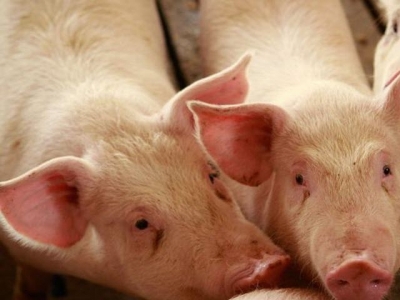Dirty pigs need more dietary threonine

Wide range of environmental and production conditions need to be considered when formulating swine diets.
Study results have confirmed that pigs raised on antibiotic-free diets in poor sanitary conditions need to have their dietary threonine levels adjusted if they are to achieve optimal growth, according to an announcement from Evonik, which manufactures synthetic threonine.
Research over recent years has highlighted the key role of threonine in immune function and the need to maintain adequate dietary threonine supply when pigs are subject to environmental challenge, Evonik said.
A study from the University of Manitoba — published in 2015 in the journal Animal Nutrition — compared the effect of increasing the ratio of dietary standardized ileal digestible (SID) threonine to lysine in weaned pigs raised under clean and unclean conditions, Evonik pointed out.
Two groups of 90 piglets weaned at 21 days were fed ad libitum on five different diets with increasing SID threonine:lysine ratios of 55, 59, 63, 67 and 71%. One group was raised under clean conditions, and the other under unclean conditions. Average daily gain, average daily feed intake and gain:feed ratio were measured and used to determine the optimal SID threonine:lysine ratio for each group.
The results showed that a SID threonine:lysine ratio of 65% produced optimal gain:feed for pigs raised under clean conditions. In less sanitary conditions, this ratio increased to 67% for optimal gain:feed.
Commenting on the results, Dr. John Htoo, director global technical support-swine at Evonik Nutrition & Care, said more scientific evidence was revealing the importance of understanding the role of amino acids beyond growth under different production conditions.
“It is becoming increasingly clear that we need to take a wide range of environmental and production conditions, such as sanitary status and antibiotic-free feeding, into consideration when formulating diets for pigs," Htoo said.
“When pigs are reared in conditions where there is a higher immune challenge, then more threonine is needed for the production of immunoglobulins. So, the need for dietary threonine is increased, and we have to adjust the diet accordingly if we do not want to compromise productivity,” he added.
According to Htoo, a better understanding of the roles of dietary components, such as functional amino acids, will allow producers to maximize the health and productivity of their animals.
Có thể bạn quan tâm
 Piglet gut health and cow milk yields on Chr. Hansen’s radar
Piglet gut health and cow milk yields on Chr. Hansen’s radar Chr. Hansen says it has developed new probiotic Bacillus strains aimed at improving gut health in piglets; the Danish company is also undertaking further work
 Canola meal diets may support sow, piglet performance
Canola meal diets may support sow, piglet performance Canola meal may provide the main dietary protein for gestating and lactating sows while maintaining sow and piglet weight gain and development, say researchers.
 Scientists report breakthrough in swine immunology research
Scientists report breakthrough in swine immunology research Scientists from four UK institutions have developed tools that they say provide new insights into pig immunity that could help develop